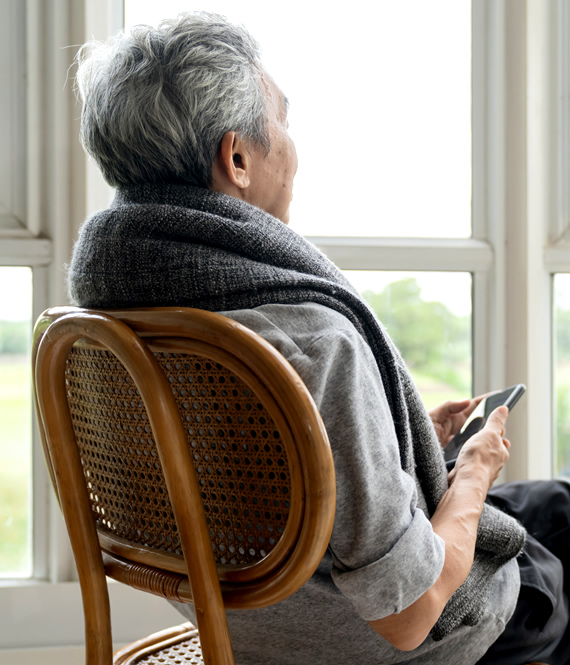
Depression in Elderly: Causes, 6 Symptoms To Watch For & How To Help
We recommend helpful products in our articles. Read our full disclosure here. The content on this website is not intended to be a substitute for professional advice, diagnosis, or treatment.
Depression can be a difficult mental health condition to navigate, especially as you age.
Depression in elderly is common, but it doesn’t mean it should be considered a normal part of the aging process.
As an adult caregiver or family member of an elderly person, you might be facing problems while taking care of them, and wondering how to reduce depression in older adults.
In order to support and assist elders in a better way, you should be aware of the symptoms of depression in elderly.
Once you notice them in an elder individual, start implementing ways to reduce depression so that you can be there for your loved ones in their time of need.
This article is based on our research on depression in elderly (also known as geriatric depression).
We will touch on a few major points to help you help the people you care about.
Causes of Depression in Elderly
Depression in elderly often has a variety of different causes.
It can be linked to physical illnesses (such as stroke, musculoskeletal, or heart disease), as physical health is more likely to deteriorate when someone ages.
But depression in older people can also stem from purely psychological issues, such as:
- Grief due to the death of a loved one;
- Loneliness;
- Financial stress;
- Changes in living conditions.
There may be multiple factors contributing to an elderly person’s depression, so it is important to take the time to explore each one.

6 Signs and Symptoms Of Depression In Elderly
Noticing signs of elder depression early can prevent further deterioration of your senior loved one’s mental health, and help them to get the treatment they may need.
Every individual’s experience with depression is unique, but there are some common signs that you can look out for.
These include:
- Loss of interest in activities they once enjoyed;
- Self-isolation and withdrawal from family and friends;
- Changes in eating or sleeping habits;
- Loss of energy;
- Difficulty concentrating, remembering details, and making decisions;
- Feelings of guilt and worthlessness.

Planning a Course of Action
Depending on the severity of your loved one’s depression, you can plan a course of action.
- If their depression is mild, you could start by talking to them and helping them find activities that they enjoy (or used to enjoy) doing.
- For mild to moderate cases, therapy and medication can be effective treatments.
Your loved one’s doctor can help you determine what type of therapy or medications may be right for them, and provide referrals to qualified mental health professionals if needed.
- For more severe cases of depression in elderly, inpatient treatment programs can offer intensive care and support until your loved one is able to manage their depression on their own.
These programs typically involve a combination of medication, therapy, and other forms of treatment such as yoga, relaxation, CBT (cognitive behavioral therapy), and art therapy.
How To Offer Support and Compassion
Your love and support can be a powerful tool in helping your aging loved one to manage their depression.
Make sure they know that you are there for them, no matter what.
Elderly people often are sensitive to seemingly small things in life.
Listen to them, validate their feelings, and be patient with them as they work through this difficult time.
Being a supportive and understanding presence can make all the difference in your loved one’s recovery.
Encourage them to take part in activities that bring them joy, regardless of how small the activity may seem.
This could be spending time with friends and family, spending some leisurely time outdoors, knitting, or reading a book.
At the end of the day, understanding and empathy can go a long way in assisting people who have signs of depression in elderly.
With your help, they may be able to find relief from their symptoms and lead a more fulfilling life.
Daily Activities For Seniors to Reduce Symptoms of Depression
Depression often causes an individual to lose interest in activities that used to bring them joy.
To reduce symptoms, you can encourage your loved one to gradually take part in activities that are both enjoyable and meaningful.
Some examples of helpful daily activities include:
- Going for age-appropriate walks, and exercising regularly;
- Doing relaxation techniques such as deep breathing, or meditation;
- Keeping a thought journal to track their thoughts and feelings;
- Connecting with friends and family over the phone or the internet;
- Doing puzzles or playing games, for example like Senior Solitaire, that don’t require too much concentration;
- Listening to calming or uplifting music;
- Enjoying hobbies like painting or gardening if their health allows it.
By taking part in activities like these, your loved one can begin to feel less isolated and more connected with the world around them.
It’s a good idea to do some of these activities together with your senior loved one because depression can make it really hard for a person to even start something.
Final Thoughts
Depression in elderly is a serious issue that should never be taken lightly.
After all, the person might not be able to support themselves as well as they used to.
If you have noticed any of the signs of depression in elderly (outlined above), make sure to talk to your loved one and help them to get the care they need.
With your help and the help of a qualified mental health professional, your loved one can take steps toward overcoming depression and negative emotions.
Remember to stay patient and compassionate throughout this process, as it may take some time for them to find relief from their symptoms.
With your support, your loved one can learn to manage their depression and live a more fulfilling life.
Helpful resource: THE NATIONAL SUICIDE PREVENTION LIFELINE
"We love to research problems, examine studies, analyze solutions, and share with you ideas that make life healthier. You can learn about us and our editorial standards here. Have suggestions or feedback to share? Send us a message!."













Leave a Comment